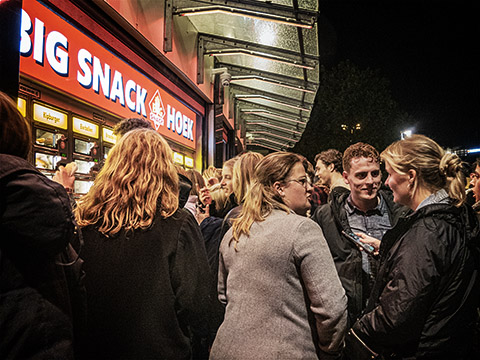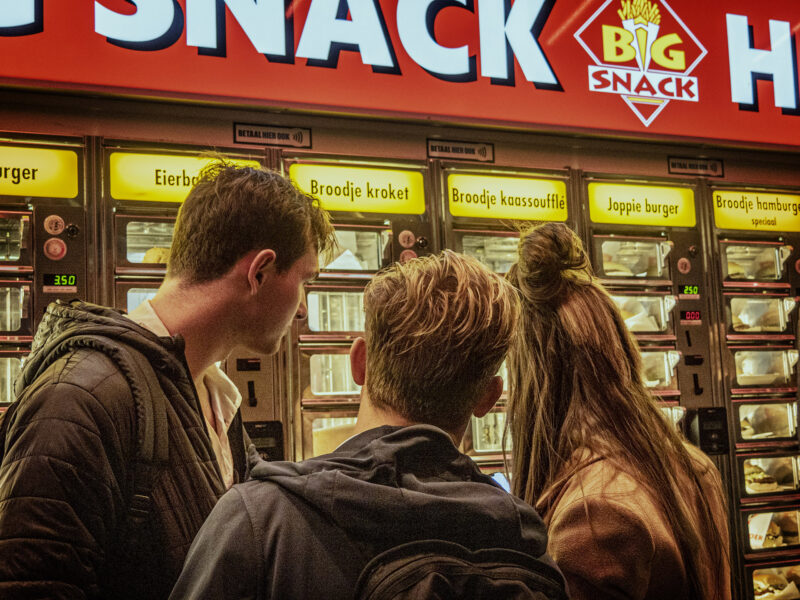
Junk food and booze pile on the pounds
Beware the Freshman 15
Kim Hurst was taken aback when she saw her Canadian high school friends again during the Christmas break. When she had left them three months earlier to move to Groningen, they had looked athletic. That had changed.
‘They had all clearly gained weight. It was very noticeable’, says the biomedical sciences research master student.
Kim’s friends had gained the infamous ‘Freshman 15’, also known as the ‘First-Year Fatties’ phenomenon. The tendency of first-year students to gain quite a lot of weight – 15 pounds equals 6.8 kilos – was first identified in the US in the eighties. But as research among two thousand first-years at the UG uncovered in 2011, it’s not just an American thing: they on average gained 2,1 kilos in their first three months at university.
Vulnerable internationals
‘Boys increased in size more than girls’, says physiology and neuro-endocrinology professor Anton Scheurink, who co-initiated the research project. ‘But there was a lot of variability in our database – from outliers gaining up to eight kilos in three months to others not expressing a significant change in weight.’
Those big differences can be explained, he thinks, by the fact that international students are even more vulnerable to weight gain than Dutch students are. Dutch first-years often still live at home with their parents or go back every weekend, which mitigates the effects of partying too much, ordering in and eating mostly junk food while in Groningen.
Boys increased in size more than girls
First-year media student Katie from Slovakia certainly recognises the phenomenon. ‘My eating patterns started changing a week into university. I was in the library from early in the mornings until late in the evenings. I only ate quick snacks.’ Even though she didn’t feel like she ate much, she still gained two or three kilos. ‘That really upset me.’
Ordering in food was – and still is – another pitfall for Katie. ‘I don’t like doing that, but sometimes when my stomach can’t handle the hunger anymore, there is no other option left.’
Romanian chemistry student Ecaterina, too, resorted to ‘pre-made meals and fast, easy, cold sandwiches to go’. She didn’t have time to cook herself and ‘those were the cheapest options in the supermarket’, she says. In the first few weeks at uni, the only thing she would cook in the evenings was pasta.
Eating with friends
According to Scheurink, the situation is the worst in North America. ‘The far-away campus, combined with fried food and no exercise. Dutch uni canteens are better, and offer more healthy choices’, he says. And Kim confirms that students have everything they need within a few steps in Canada: supermarket, gym, doctor. ‘Not to mention that the canteens are set up on an “all you can eat” basis and students never seem to drink water, only soft drinks like Coca-Cola.’
But first-year students in the Netherlands gain weight just as much, and Scheurink’s current research aims to get to the root of the problem. Kim worked with Scheurink for her master thesis last year. They researched whether fifty-one students’ eating habits changed depending on whether they were eating with a friend or a stranger.
To do that, they used a special scale, the Mandometer, which is placed under a plate of food and records both the weight of the food that’s ingested, how fast the person eats and the duration of the meal.
No attention
They found that social interactions during a meal make no significant difference in caloric intake, although the meal takes longer when a person is eating with someone they don’t know. ‘That didn’t coincide with what we found in the literature, which was interesting’, Kim says. Earlier research holds that people consume more food when they eat with at least one other person.
But what did make a difference, was when people didn’t pay much attention to what they were eating. In another of Scheurink’s studies with the Mandometer, students – some in groups, others on their own – were required to watch a fifteen-minute movie, during which they had unlimited access to food. The vast majority of the test subjects ate more than necessary.
Every time I meet up with friends to eat, we also watch something
That’s exactly the kind of socialising students like to do. ‘Every time I meet up with friends to eat, we also watch something. Always. It’s normal’, says Ecaterina. And Katie doesn’t like to eat alone, ‘so I try to eat most meals with friends. Eating alone makes me sad.’
Sam, a Nigerian student who moved to Groningen this year for his master in molecular medicine and innovative treatment, also does other things while he eats. ‘I multitask. Sometimes I work on my computer, or I watch tv, or I study.’
Alcohol
Of course, alcohol intake also plays a role in weight gain. ‘Because I’m a newbie here and I’ve been lucky to have met so many new friends, I go out quite often and then I drink a lot’, Katie says. Afterwards, her stomach takes at least a week to recover. ‘The food is not as balanced as it used to be back home.’
Sam doesn’t drink alcohol when he goes out on Fridays, he says. ‘I only do mocktails. But even so, I usually feel hungry when I get back at 3 or 4 in the morning. Bread saves the day before I go to sleep.’
Bread saves the day before I go to sleep
He’s gained weight, but he’s not really concerned about it. ‘There are a lot of stressors in motion: moving to a different country, getting a visa, shopping for groceries every weekend. It doesn’t bother me, to be honest.’
Katie is less sanguine, though. ‘It makes me upset that I’ve gained weight, because I worked hard before to keep my weight balanced’, she says. ‘I’m trying to hit the gym everyday now and make it back to my normal weight.’
Katie has reason to hope, according to Ecaterina, who’s in her second year now. She managed to arrive at a new ‘normal’. ‘I started to eat very differently here than I used to at home, and it impacted me emotionally and mentally. But now I’ve adapted. I meal-prep a lot and I gained more muscle mass from biking, which helps me to keep my weight in check.’
